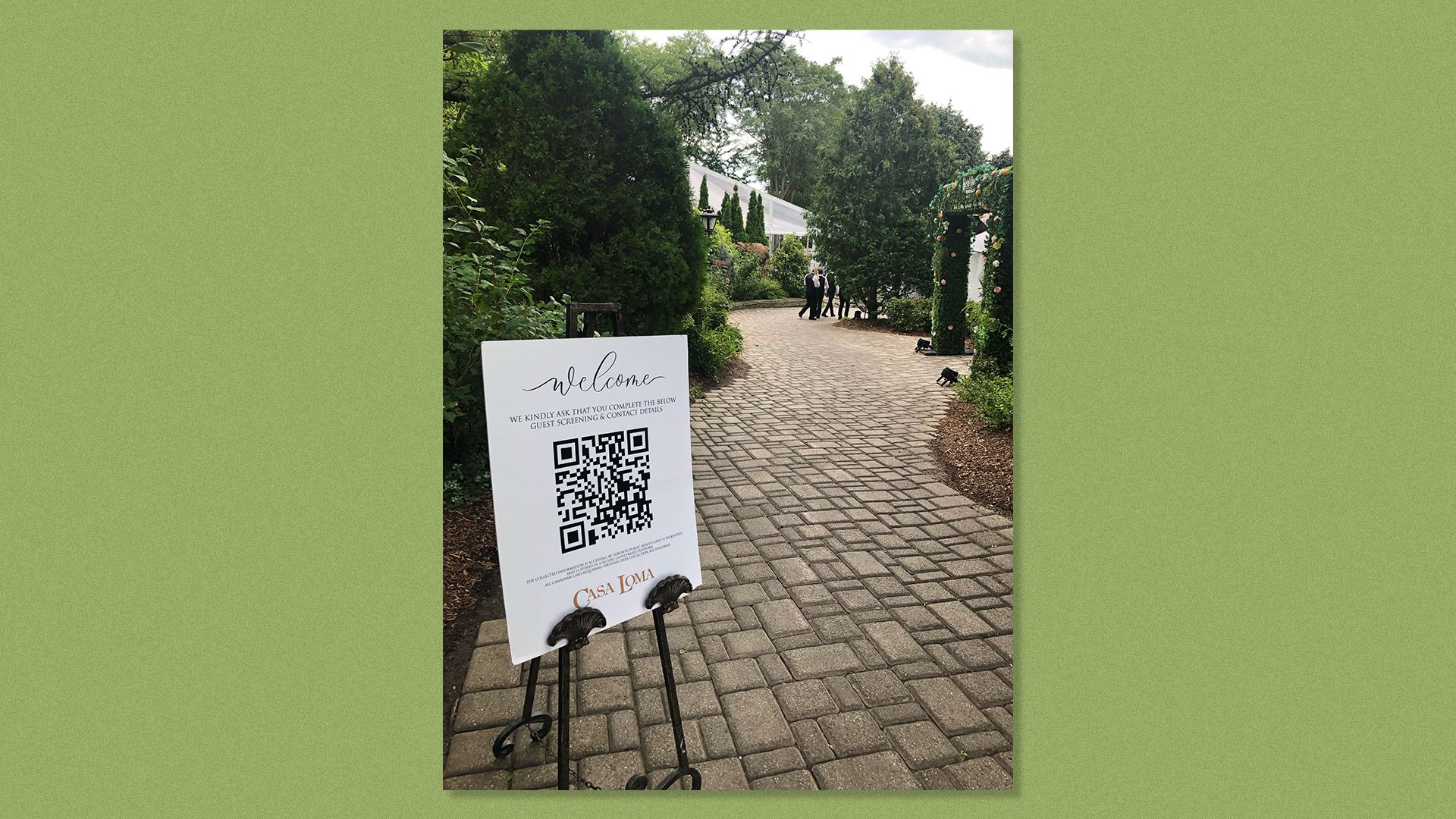| |
| |
| |
| Presented By General Motors |
| |
| Axios What's Next |
| By Jennifer A. Kingson, Joann Muller and Erica Pandey ·Oct 08, 2021 |
| Here at What's Next, we're wondering: With New York City libraries ending late fees forever, could other places be next? - Today's reader photo comes from Ali Abdelhamid, who was struck with what he saw at a recent wedding in Toronto.
- Please send your photo about the evolving state of how we live today to whatsnext@axios.com.
Today's Smart Brevity count: 1,246 words ... 4.5 minutes. |
| |
| |
| 1 big thing: Atlanta's whitest neighborhood may secede |
 |
|
| Illustration: Brendan Lynch/Axios |
| |
| They're calling it "Buckxit": The proposal by the affluent Atlanta neighborhood of Buckhead — an epicenter of urban luxury — to break off into a municipality known as Buckhead City, as Jennifer A. Kingson and Thomas Wheatley write. Why it matters: The petition, now before the Georgia legislature, raises squirm-inducing issues of class, race and crime. Buckhead City, with 90,000 residents, would carve off a fifth of Atlanta's population and be about three-quarters white. (Atlanta itself is currently majority Black.) - The secession "would strike at the power of Atlanta's Black political class," per Bloomberg Businessweek.
- "Today, a mostly Black cast of elected officials is in charge of the largest city in the South, which has one of the highest concentrations of Fortune 500 company headquarters in the nation."
Where it stands: While there are many "political hurdles" to jump (as Bloomberg Businessweek put it), the measure will probably be put to a vote next year, and the city could be established by June 2023. - Proponents cite rising crime as a big motive: "We are living in a war zone in Buckhead," Bill White, CEO of the Buckhead City Committee, told Bloomberg Businessweek. "Shootings and killings, it just never ends."
Opponents of "Buckxit" say the proposed municipality comes with a host of complexities about operating city services and schools, as Thomas writes in Axios Atlanta. - Questions include whether Buckhead City would be on the hook for things like bond debt and pensions, and how these might affect Atlanta.
- Losing the affluent swath of north Atlanta neighborhoods would cost City Hall as much as $116 million and Atlanta Public Schools $232 million in recurring tax revenue, according to a study by KB Advisory Group and paid for by the Buckhead Coalition, the north Atlanta business group opposed to cityhood.
What they're saying: White, the Buckxit leader, tells Axios the new city intends to honor its fair share of Atlanta's debt and pension obligations. It would pay for police and most city services but would opt to contract water service and schools. What's next: White says that on Jan. 1, cityhood boosters will give the legislature an as-of-now-unreleased start-up budget. Share this story. Go deeper: Read the Axios Atlanta story |
    |
| |
| |
| 2. Why everyone's talking about "Squid Game" and dalgona |
 |
|
| Dalgona Korean sugar candies. Photo: Natasha Breen/REDA&CO/Universal Images Group via Getty Images |
| |
| If you haven't heard of "Squid Game," a Netflix series that has taken South Korea by storm — and seems poised to do the same in the U.S. — here's what you need to know: - "Squid Game" is a nine-episode miniseries with a "Hunger Games"-type plot, set in a dystopian world in which desperate people compete in deadly children's games to win a huge cash prize.
- One plot element involves a toffee-style candy called dalgona, made from melted sugar and baking soda — and that's why both the candy (often sold in lollipop form) and dalgona coffee have gone viral on TikTok. (You can make the candy in under 10 minutes, per a hot-off-the-press NYT recipe.)
- The third episode of "Squid Game" is "all about ppopgi," a game in which kids use needles to try to pick up shapes stamped into brittle dalgona, the Times reports.
Why it matters: The show — with its creepy-looking masked guards whose red costumes are likely to be omnipresent this Halloween — points to uncomfortable socioeconomic truths that resonate in many societies, the Times explains. - "Squid Games" has "tapped a sense familiar to people in the United States, Western Europe and other places, that prosperity in nominally rich countries has become increasingly difficult to achieve, as wealth disparities widen and home prices rise past affordable levels."
- It's "now the top-ranked show in the United States on Netflix and is on its way to becoming one of the most-watched shows in the streaming service's history," per the Times.
Share this story. |
    |
| |
| |
| 3. Latino businesses get scant venture capital |
 |
|
| Illustration: Aïda Amer/Axios |
| |
| Less than 1% of funds from the top 25 venture capital and private equity firms wind up in the hands of Latino-owned businesses — despite the fast pace of Hispanics opening up new enterprises, Russell Contreras writes in Axios Latino, reporting on a new study. Why it matters: The meager VC and PE investment going to Latinos highlights the lack of capital Hispanics face when trying to launch businesses and prevents growth in one of the fastest-growing segments of the U.S. economy. Details: A scant few of Latino businesses received any of the $487 billion invested across a sample of the top 500 largest venture capital and private equity deals in 2020, according to a study by Bain & Company, the Stanford Latino Entrepreneurship Initiative and the research nonprofit firm Latino Donor Collaborative. - That lack of investment comes as Latino entrepreneurs are responsible for about 50% of net new small-business growth in the U.S. over the past decade, according to data from 2007 to 2017.
- Those Latino-owned businesses are growing in annual revenue faster than white-owned businesses, the study said.
Read the full story. |
    |
| |
| |
| A message from General Motors |
| See our vision for the future in focus at GM Investor Event 2021 |
| |
 |
| |
| To realize our vision of a world with zero crashes, zero emissions and zero congestion, General Motors is scaling the power of our hardware and software to redefine experiences and services. This is how our platforms will change everything. |
| |
| |
| 4. Why the art dealer Masterworks is worth $1 billion |
 |
|
| Illustration: Eniola Odetunde/Axios |
| |
| Masterworks is a company that buys paintings and securitizes them, selling off partial ownership to individual investors. It was valued this week at more than $1 billion — which is more than the aggregate value of all the art it has ever bought, Felix Salmon writes in Axios Capital. Why it matters: The value of Masterworks itself is growing much more quickly than the value of any of the art it's investing in. As a result, there's a strong case that Scott Lynn, its CEO, has created the most lucrative art-dealing business model of all time. How it works: The art world historically spends very little on marketing. Beyond understated full-page ads in Artforum, it's rare to see art being advertised. Masterworks has revolutionized the industry by spending profusely on ads across the internet — including ads in the Axios Markets newsletter. - The pitch: Masterworks doesn't sell art as a noble, uplifting or aesthetic consumption good. Instead, it sells art as an alternative asset class — a place for investors to find returns that have a low correlation with stocks or bonds.
- Anybody who expresses an interest in such an investment is then subjected to a high-pressure sales call from a Masterworks employee — as recounted to Axios by two individuals on the receiving end of such calls. Paintings are sold as fractional investments that are selling out fast, at which point the opportunity to buy them at the initial offering price will be gone.
- While there is a secondary market in the shares, it's only available to people who have previously bought investments directly from Masterworks.
Be smart: While Lynn is happy to tell financial journalists that "investing in one of these paintings, you're never going to earn 10 times your money," his advertising cites made-up returns that can exceed 800 times. The bottom line: While art tends to appreciate slowly if at all, Masterworks has perfected a business model that allows it to flip art at a 10% gross profit every time it buys — and to still retain 20% of the upside on the art, plus a management fee, on the art it has already sold. Lynn says the company is already profitable. Read the full story. |
    |
| |
| |
| 5. Reader photo of the day |
 |
|
| Photo: Ali Abdelhamid |
| |
| What's Next: The ubiquity of QR codes Ali Abdelhamid of Ontario writes: "I attended a wedding at Casa Loma in Toronto [in September] and was reminded of the widespread adoption of digital QR codes for everything from menus at restaurants to digital COVID screenings/contact tracing applications. "This picture below was one such use case. COVID-19 accelerated many future trends, and digital QR codes seem to be one of them." |
    |
| |
| |
| A message from General Motors |
| See our vision for the future in focus at GM Investor Event 2021 |
| |
 |
| |
| To realize our vision of a world with zero crashes, zero emissions and zero congestion, General Motors is scaling the power of our hardware and software to redefine experiences and services. This is how our platforms will change everything. |
| |
| Was this email forwarded to you? Sign up here for Axios What's Next. |
 | | It'll help you deliver employee communications more effectively. | | |
No comments:
Post a Comment